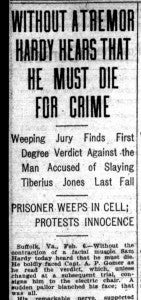The murder of Grac Jones: Chapter 14
Published 8:36 pm Monday, August 10, 2015
The jury and the verdict
EDITOR’S NOTE: On the evening of Oct. 26, 1908, five shots rang out in the village of Holland. Tiberius Gracchus “Grac” Jones lay dying on the ground inside the gate leading to his home. “They have killed me and killed me for telling the truth,” he told a friend as his life ebbed away. This is the 14th in a series of articles about the Jones murder case. Suffolk historian Kermit Hobbs Jr. compiled the 18-part series from personal accounts, newspaper stories and court records he has studied from the period.
By Kermit Hobbs Jr.
Special to the News-Herald
Jury deliberations in the trial of Sam Hardy for the murder of Grac Jones began Saturday morning, Feb. 6, 1909. The jury’s decision would determine whether Sam Hardy would go free or die in the electric chair.
Judge McLemore had already given the jury instructions to guide their deliberations on the previous day, but this morning the defense team requested permission to present one further statement to the jury.
The defense team was concerned that in Col. Cabell’s powerful closing statement the night before, he had confused the jurors. They contended that he had spoken so much about the need to fight crime in general, that the jurors might have become less focused on the facts presented on this particular case.
Over the vigorous opposition of the prosecution, the Judge McLemore allowed Judge R.H. Rawls of the defense team to address the jury.
Judge Rawls urged the 12 Nansemond County men to “be guided by the evidence as they heard it and as they remembered it” and “not find the defendant guilty because they think the commission of a crime should be stopped in this country.”
“Unless they believe beyond a reasonable doubt that in this case the defendant is guilty as charged,” he said, “they should acquit the defendant.”
Most of the observers in the courtroom expected an acquittal or, at least, a hung jury.
The 12 men adjourned to the jury room at 10:14 a.m. As had been their custom at the beginning of each day’s proceedings, the jurors observed a moment of silent prayer for divine guidance. Some of the men knelt as they prayed.
The jurors elected James Britton to serve as their foreman.
The deliberations began with a discussion of the evidence that had been presented. The point the jurors fixed most firmly upon was the shotgun forearm that had been found at the crime scene and traced back to Sam Hardy.
After a period of discussion, the jurors took their first vote. It was unanimous. They found Sam Hardy guilty of the murder of Tiberius Gracchus Jones.
At 11: 15 a.m., after only an hour, the jurors returned to the courtroom. Their somber walk made it obvious, even to spectators in the back of the room, that the news would not be good for Sam Hardy.

This newspaper clipping describes Sam Hardy’s reaction upon learning he has been found guilty in the murder of Tiberius Gracchus “Grac” Jones. (Submitted Photo)
The Virginian-Pilot reported, “Nearly half of the jurors were weeping under the gravity of the burden they bore. Great briny tears streamed from the eyes of mature and grizzled men, trickled over seamed and bearded faces, and fell silent to the floor.”
Mr. Britton handed the indictment to the clerk, who commanded Sam Hardy to stand up and hear the verdict. He read aloud, ”We, the jury, find the prisoner guilty of murder in the first degree.”
Sam Hardy did not flinch, but the color drained from his face. He kept his eyes fixed upon the clerk as he slowly sat down.
As soon as order was restored in the courtroom, Judge Rawls of the defense moved for a new trial on grounds that would be laid out later.
Hardy’s nerve temporarily failed him and he broke down and wept. He “protested his innocence appealingly and expressed the wish that his aged mother might not be told of the verdict.”
Hardy’s friends surrounded him in an effort to comfort him. It was clear that they and the defense team would leave no stone unturned in an effort to save him from the electric chair.
TOMORROW: Appeals and petitions





